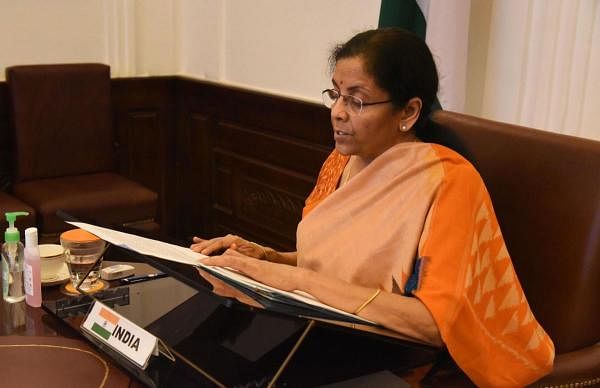
Finance Minister Nirmala Sitharaman while addressing a press conference unveiled the details of the Rs 20 lakh crore economic stimulus package that was announced by Prime Minister Narendra Modi on May 12. The finance minister announced six relief measures for MSMEs, two measures each for EPF and NBFCs and MFIs, one each for discoms, contractors, real estate, and three tax measures.
Here are the key takeaways from FM Sitharaman's press conference:
1. FM Sitharaman announced collateral-free automatic loans to MSMEs worth Rs 3 lakh crore. These have four-year tenor, valid up to October 31, 2020. It will benefit 45 lakh units, allowing them to resume activity and safeguarding jobs.
2. Government to provide stressed MSMEs with equity support worth Rs 50,000 crore. The equity infusion for MSMEs will be through Fund of Funds and it will be operated through a Mother Fund and few daughter funds.
3. The government will facilitate the provision of Rs 20,000 crore as subordinate debt to stresses MSMEs.
4. The FM gave a revised definition of MSMEs with investment limit being revised upwards and additional criteria of turnover being introduced.
5. Revised MSME Classification:
Micro: Investment <Rs 1 cr and turnover <Rs 5 cr
Small: Investment <Rs 10 cr and turnover <Rs 50 cr
Medium: Investment <Rs 20 cr and turnover <Rs 100 cr
6. Global tenders to be disallowed in government procurement up to Rs 200 crore. "This will make self-reliant India, will also then be able to serve 'Make in India'," said FM Sitharaman.
7. The Government of India and Central Public Sector Enterprises will honour every MSME receivable in the next 45 days.
8. To ease financial stress as businesses get back to work, the government decided to continue EPF support for business and workers for three more months providing a liquidity relief of Rs 2,500 crore. The Government of India will provide both employer and employee's 12 percent contributions. Nearly 3.6 lakh establishments and 72.22 lakh employees will benefit from the move, the finance minister said.
9. Statutory PF contribution by an employer has been reduced to 10 percent from 12 percent earlier to provide Rs 6,750 crore liquidity relief.
10. The government launched a Rs 30,000 crore Special Liquidity Scheme for non-banking financial companies, microfinance companies, housing finance companies. The government announced Rs 45,000 crore liquidity infusion through a Partial Credit Guarantee Scheme 2.0 for NBFCs.
11. For discoms that are facing unprecedented cash flow problems and are unable to pay gencos, the government will provide one-time emergency liquidity infusion of Rs 90,000 crore. This will be a state-issued guarantee and rebate will be provided to those discoms that pass the benefit to end-customer.
12. In a major relief to contractors, all Central agencies to provide an extension of up to six months, without cost to contractor, to obligations like completion of work covering construction and goods and services contracts.
13. Tax Deducted at Source (TDS) for a period up to March 31, 2021, has been cut by 25 percent.
14. The due date for Income Tax Returns for the year 2019-2020 has been extended from July 31 and October 31 to November 30, 2020
15. The finance minister said that essentially this is to spurt growth and to build a very self-reliant India and that is why this whole initiative is called Atmanirbhar Bharat Abhiyan. Five pillars of Atmanirbhar Bharat are economy, infrastructure, system, demography and demand, Finance Minister Nirmala Sitharaman reiterated.
16. The finance minister clarified that self-reliant India does not mean cutting off from rest of the world.
17. Our focus would be on land, labour, liquidity and law, said the finance minister.
18. The Rs 20 lakh crore economic package will spur growth and build a self-reliant India, FM Nirmala Sitharaman said.
19. PM laid out a comprehensive vision, and that vision was laid out after wide consultations with several sections of the society, she said.
20. The Direct Benefit Transfer, Microinsurance schemes, PM Awas Yojana, PM Ujjwala Yojana, Swachh Bharat and Ayushman Bharat were all transformative reforms which have benefited the poor in a big way, said FM Nirmala Sitharaman.
21. We shall not forget that we do have a responsibility towards the poor, needy, the migrant workers, divyang and the aged of the country, said FM Nirmala Sitharaman.